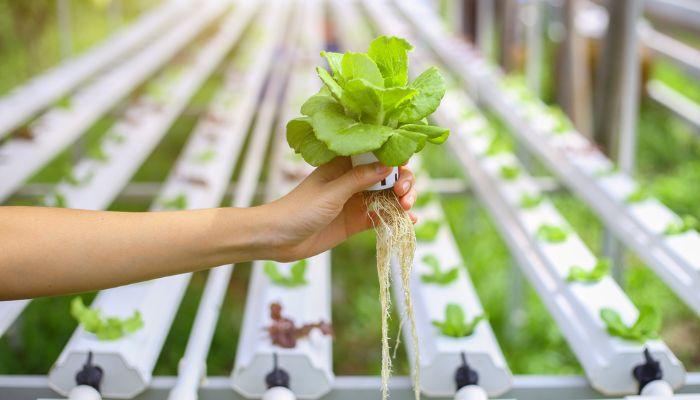In a quiet corner of Ogun State, the scent of fresh peppers fills the air — but there’s no soil in sight. Instead, trays of vegetables hang in neat rows, their roots nestled in coco peat and fed by precise drips of nutrient-rich water. This is Soilless Farm Lab, a place where farming meets technology, and where young Nigerians are reshaping what it means to grow food.
Among them is Babajide Taofeek, a recent agricultural economics graduate who never imagined he’d find his calling inside a greenhouse. “This isn’t farming the way my father did it,” he says with a grin. “It’s cleaner, smarter — and it actually works.”
Taofeek’s words echo a growing realization across Nigeria: agriculture’s future will not be rooted in soil, but in systems.
From Soil to Systems
Nigeria’s farmlands are under siege. Nearly two-thirds of the country’s arable land is degraded, worn thin by erosion, deforestation, and overuse. Insecurity, displacement, and erratic weather compound the crisis — leaving millions food-insecure and many young Nigerians disinterested in farming altogether.
But where most see crisis, a new generation of agripreneurs sees opportunity. Leading that shift is Samson Ogbole, a biochemist who traded test tubes for troughs when he founded Soilless Farm Lab in 2019.
Spread across 120 acres in Awowo, Ogun State, the hub looks more like a research institute than a farm. Inside its glassy greenhouses, vegetables thrive in rice bran and sawdust under the steady glow of LED lights. Smart sensors measure humidity and oxygen, while automated systems feed the crops in perfect balance — no guesswork, no pesticides, no wasted water.
Ogbole calls it controlled environment agriculture, or CEA — a system that allows plants to grow anywhere, anytime, with up to 90% less water than traditional farming. “Rain should no longer decide whether Nigerians eat,” says Emmanuel Atolagbe, the farm’s manager. “Hunger isn’t seasonal — so food production shouldn’t be either.”
Where Innovation Meets Youth Empowerment
The farm isn’t just about growing vegetables; it’s about growing people. Since its inception, Soilless Farm Lab has trained over 10,000 young Nigerians in hydroponics, agritech, and business development — with support from the Mastercard Foundation.
For participants like Taofeek, the training was life-changing. Within months, he transitioned into a tech-driven role at Orange Farm Technology Limited in Abia State. “We’re now exploring how robots can handle planting and harvesting,” he says. “Technology doesn’t replace farmers — it upgrades them.”
Adeshina Ajibade, another graduate, joined the program out of curiosity. Without land or prior experience, he discovered that farming no longer required acres — just ambition. “I thought I needed soil to grow something,” he laughs. “Turns out, I just needed the right mindset.” Today, Ajibade applies his new branding and marketing skills to his career as a graphic designer — proof that agricultural training can sprout beyond the farm.
Promise, Potential, and Price Tags
Experts agree that Nigeria’s controlled farming revolution holds enormous promise. Dr. Ahmad Ladan Ala, an agricultural economist, calls it “a shield against climate and conflict.” By using less land and water, CEA offers a way to produce food safely in cities and insecure regions alike.
Yet, innovation comes with costs. Greenhouses, pumps, solar panels, and irrigation systems require capital — and reliable electricity remains a challenge. “The technology is powerful but technical,” warns Oyewale Abdul-Rasheed, a crop production specialist. “Without training, smallholder farmers may find it out of reach.”
This reality means that, for now, soilless farming primarily attracts educated youth and early adopters, not the rural farmers most affected by land degradation. Still, Ogbole insists that the solution lies in scalable financing and policy support, not in abandoning innovation.
A Local Revolution with Global Relevance
Ogbole’s vision extends far beyond Awowo. His model mirrors agricultural tech success stories in Singapore, Kenya, and the UAE, where cities are turning rooftops and warehouses into farms. With Nigeria’s population expected to surpass 400 million by 2050, he believes soilless systems aren’t an alternative — they’re a necessity.
“Food insecurity is no longer a distant threat,” Ogbole says. “If we don’t innovate now, we’ll be eating imports while sitting on empty land.”
The demand already exists. Urban Nigerians are increasingly willing to pay more for fresh, pesticide-free produce. Restaurants and hotels seek steady, local supply chains. Add the country’s soaring 40% youth unemployment rate, and the opportunity becomes clear: food tech could become Nigeria’s next oil.
Farming Without Borders
Back in Abia State, Taofeek no longer sees farming as drudgery. “Before, farming meant sweat and suffering,” he says. “Now it’s sensors, data, and business.”
At Soilless Farm Lab, Ogbole shares the same optimism. “We’re not just teaching people to farm,” he says. “We’re teaching them to innovate, to create value, and to turn agriculture into a business for the next generation.”
Nigeria’s agricultural renaissance might not begin with tractors or plows — but with young innovators armed with laptops and lab coats. And in greenhouses across Awowo, the seeds of that future are already growing.

